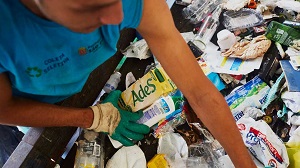Indonesia has intensified its environment protection following government announcement of a target to cut plastic waste by 70%. Environment and Forestry Minister Siti Nurbaya Bakar explalined that Indonesia currently generates up to 65 million tons of waste annually with 14% or 9 million tons of it are plastics. Thus, the government has been pushing local administrations to increase awareness on environment protection and reduce plastic waste. The local governments will need to take an active role in committing to alleviate the problem.
The commitment was further emphasized by Coordinating Maritime Affairs Minister Luhut Panjaitan, who announced that the target reduction should be accomplished by 2025.The government also announced a budget of up to $1 billion annually to implement the strategy which is part of the national action plan for waste management in oceans, in conjunction with the United Nations Environmental Program.
Indonesia, being in the center of the Coral Triangle, has important marine biodiversity and the government effort aims to preserve Indonesia’s marine life which has attracted tourists, as well as ensure that fisheries and foods be made available locally.
The Ministry’s policies to reduce Indonesia’s plastic waste include initial plans to use biodegradable plastic alternatives, such as cassava and seaweed products, educating people on the importance of environment protection and a possible nationwide tax on the use of plastic bags. A trial tax for single-use plastic bags was imposed in 23 Indonesian cities in 2016.
New packaging recycling technology
Some large manufacturers of plastic products have started to abide by the new strategy. Consumer goods giant Unilever has opened a new facility in Indonesia as part of a pilot project for introducing a new technology for recycling sachets used to hold shampoos and other products. Single-use sachets are widely sold in developing and emerging markets such as Indonesia. Unilever said billions of such packages -- including its own -- are sold every year, but that recycling them has long been a problem due to technological hurdles.
To address this, Unilever said it has developed a technology it calls the CreaSolv Process together with the Germany-based Fraunhofer Institute for Process Engineering and Packaging IVV. "With this innovative pilot plant we can, for the first time ever, recycle high-value polymers from dirty, post-consumer, multilayer sachets," said Andreas Maurer, head of the plastic recycling department at Fraunhofer.
The facility, in Sidoarjo, East Java, will test the long-term commercial viability of the technology. If successful, it will be applied in other developing markets, especially in Southeast Asia, said Sancoyo Antarikso, director for governance and corporate affairs at Unilever Indonesia.
The company plans to work with local waste collectors, waste banks and retailers to help collect used sachets.
"Using this approach, we'll be able to reduce our environmental footprint, while creating economic value and potential additional incomes for the communities, the recycling industry and other stakeholders," Mr. Antarikso said.
Unilever Indonesia hopes the Indonesian government will promote the concept of separating household waste to make collecting sachets easier. Currently, most Indonesian households do not separate their recyclable and nonrecyclable waste, as the country's outdated waste management system is not yet capable of accommodating the practice.
Indonesia produces an estimated 0.5 million to 1.3 million metric tons of plastic marine debris every year, making it the second-largest producer of plastic waste polluting the world's oceans after China, according to a study published at the Science journal in 2015.
The new recycling facility will initially be able to process 3 tons of plastic sachets every day. Antarikso said once the operations prove viable from the business side, Unilever will let a "business partner" take over to handle commercial-scale production.

Unilever has developed a technology, CreaSolv Process, together with Fraunhofer Institute.
Adidas NMD R1
 iConnectHub
iConnectHub
 Login/Register
Login/Register Supplier Login
Supplier Login


























